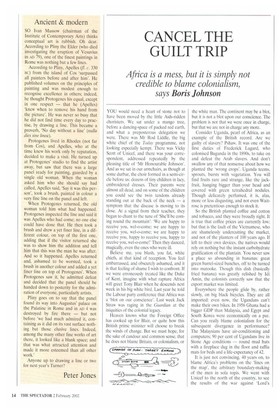Ancient & modern
SO Ivan Massow (chairman of the Institute of Contemporary Arts) thinks conceptual art is rubbish. Oh dear. According to Pliny the Elder (who died investigating the eruption of Vesuvius in AD 79), one of the finest paintings in Rome was nothing but a few lines.
According to Pliny, Apelles (ft c. 330 BC) from the island of Cos 'surpassed all painters before and after him'. He published volumes on the principles of painting and was modest enough to recognise excellence in others; indeed, he thought Protogenes his equal, except in one respect — that he (Apelles) 'knew when to remove his hand from the picture'. He was never so busy that he did not find time every day to practise, by drawing a line. This became a proverb, No day without a line' (nulla dies sine linea).
Protogenes lived in Rhodes (not far from Cos), and Apelles, who at the time knew his work only by reputation, decided to make a visit. He turned up at Protogenes' studio to find the artist away, but saw that there was a large panel ready for painting, guarded by a single old woman. When the woman asked him who she should say had called, Apelles said, 'Say it was this person', took a brush, painted in colour a very fine line on the panel and left.
When Protogenes returned, the old woman told him what had happened. Protogenes inspected the line and said it was Apelles who had come; no one else could have done that. He then took a brush and drew a yet finer line, in a different colour, on top of the first one, adding that if the visitor returned she was to show him the addition and tell him that this was the man he was after. And so it happened. Apelles returned and, ashamed to be worsted, took a brush in another colour and added a yet finer line on top of Protogenes'. When Protogenes saw it, he admitted defeat and decided that the panel should be handed down to posterity for the admiration of everyone, particularly artists.
Pliny goes on to say that the panel found its way into Augustus' palace on the Palatine in Rome and in AD 4 was destroyed by fire there — but not before 'we had much admired it, containing as it did on its vast surface nothing but those elusive lines. Indeed, among the many other fine works of art there, it looked like a blank space; and that was what attracted attention and made it more esteemed than all other work.'
Anyone up to drawing a line or two for next year's Turner?
Peter Jones






























































 Previous page
Previous page